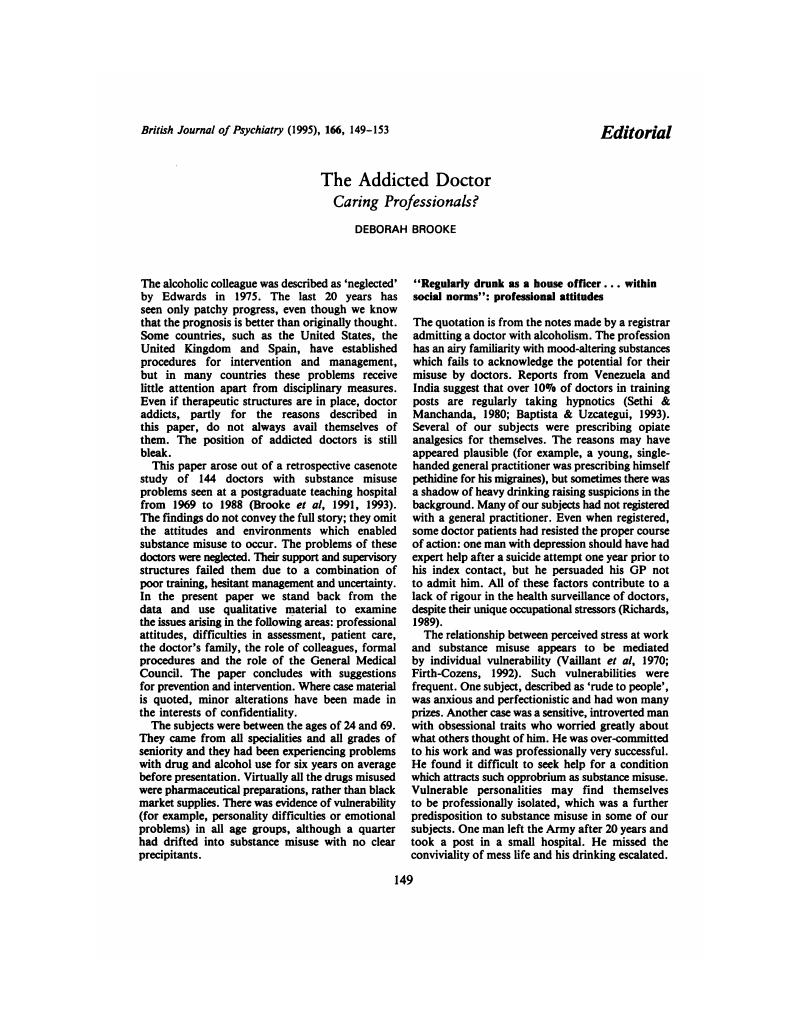Crossref Citations
This article has been cited by the following publications. This list is generated based on data provided by Crossref.
Raistrick, Duncan
1996.
Management of alcohol misuse within the context of general psychiatry.
Advances in Psychiatric Treatment,
Vol. 2,
Issue. 3,
p.
125.
Brooke, Deborah
1997.
Impairment in the medical and legal professions.
Journal of Psychosomatic Research,
Vol. 43,
Issue. 1,
p.
27.
Huyse, F.J.
1997.
From consultation to complexity of care prediction and health service needs assessment.
Journal of Psychosomatic Research,
Vol. 43,
Issue. 3,
p.
233.
Wilhelm, Kay
Diamond, Michael
and
Williams, Anthony
1997.
Prevention and treatment of impairment in doctors.
Advances in Psychiatric Treatment,
Vol. 3,
Issue. 5,
p.
267.
Benbow, Susan M.
1998.
Burnout: current knowledge and relevance to old age psychiatry.
International Journal of Geriatric Psychiatry,
Vol. 13,
Issue. 8,
p.
520.
Wijesinghe, Channa P
and
Dunne, Fionnuala
1999.
Impaired practitioners notified to the Medical Practitioners Board of Victoria from 1983 to 1997.
Medical Journal of Australia,
Vol. 171,
Issue. 8,
p.
414.
van der Stel, J.C.
2001.
Handboek Arbeid en Belastbaarheid.
p.
1024.
2002.
Language for Those Who have Nothing.
p.
73.
Swanson, S. P.
Roberts, L. J.
and
Chapman, M. D.
2003.
Are Anaesthetists Prone to Suicide? A Review of Rates and Risk Factors.
Anaesthesia and Intensive Care,
Vol. 31,
Issue. 4,
p.
434.
Marshall, E. J.
2008.
Doctors' health and fitness to practise: treating addicted doctors.
Occupational Medicine,
Vol. 58,
Issue. 5,
p.
334.
Hassan, Tariq M
Ahmed, Syed O
White, Alfred C
and
Galbraith, Niall
2009.
A postal survey of doctors' attitudes to becoming mentally ill.
Clinical Medicine,
Vol. 9,
Issue. 4,
p.
327.
Strang, John
Gossop, Michael
and
Witton, John
2010.
Principles of Social Psychiatry.
p.
259.
Kunyk, Diane
Inness, Michelle
Reisdorfer, Emilene
Morris, Heather
and
Chambers, Thane
2016.
Help seeking by health professionals for addiction: A mixed studies review.
International Journal of Nursing Studies,
Vol. 60,
Issue. ,
p.
200.






eLetters
No eLetters have been published for this article.